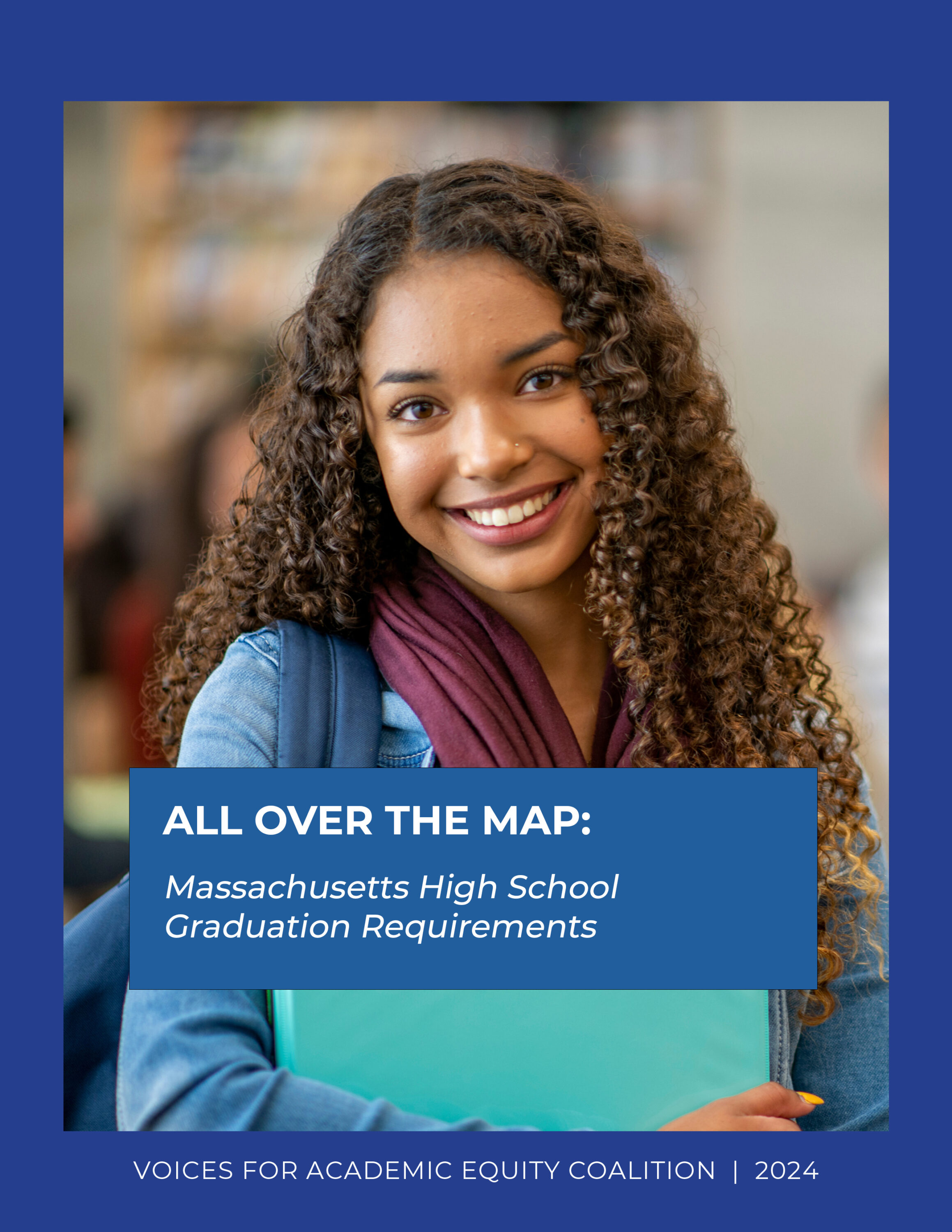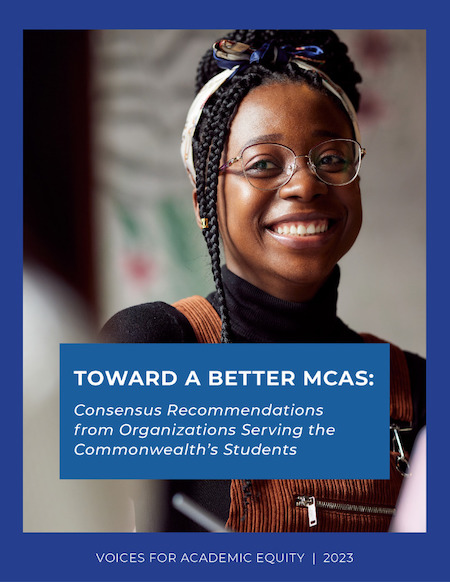
Who We Are
We are nonprofit and community leaders representing classroom educators, school leaders, parents, advocates, and employers committed to the promise of equitable and high quality public education. We focus on ensuring that students and their families – especially those who have been systemically marginalized – have the access, information and tools they need and deserve to thrive in school and prepare for success in college and careers.
Our Coalition Partners















Our Work
Our coalition came together to provide a united voice for equity and to address a number of important issues in Massachusetts education. We are dedicated to projects that will ensure academic equity and do this by conducting research and sharing evidence, informing policy makers, legislators, and public opinion, and ensuring a balanced media and social media coverage across the state.
Recent Work: All Over the Map: Massachusetts High School Graduation Requirements
When it comes to the courses high schoolers across the Commonwealth are required to complete for their diplomas, Massachusetts sets few requirements and collects no school level data. Instead, each high school makes their own determination about the courses required for students to graduate. Until now, no one has known, statewide, what those requirements are.
This MassCore brief, is a first-ever analysis of high school course requirements, and reveals a wide variation in students’ learning experiences across high schools in Massachusetts. Review how “all over the map” Massachusetts graduation requirements are and recommendations from the Voices Coalition for how to ensure more equity in the short and long term.
Prior Work: The Courses They Take
MassCore standards, is a program of study recommended by the Massachusetts Department of Elementary and Secondary Education (MA DESE) “intended to align high school coursework with college and workforce expectations.” With an eye toward equity and opportunity, we reviewed data on schools and districts finding discrepancies in access and completion of the MassCore recommended course of study. Given the role high school courses play in students’ future success, what policies are in place to ensure access to the full array of college-and career-ready courses for all of the Commonwealth’s students?
Our report, The Courses They Take, The Impact of the MassCore High School Program of Study on Student Success, is a culmination of our collective work, findings, and recommendations.
Prior Work: Towards a Better MCAS
We maintain that MCAS, while in need of targeted revisions, is the primary means for providing students, families, educators and policymakers with the objective, valid, reliable, comparable information essential to determining gaps in outcomes, preparedness for college and career success, and where additional resources are most needed — especially for those who have been and continue to be systemically marginalized: students of color, those with disabilities, English Learners, and students from low income families.
Our report, Toward a Better MCAS: Consensus Recommendations from Organizations Serving the Commonwealth’s Students, is a culmination of our collective work, findings, and recommendations.
What Brought Us Together
Our coalition came together to provide a united voice for equity and to address a number of important issues related to education in Massachusetts. We aim to:
- Promote equity for all students in the Commonwealth
- Inform policymakers, legislators, and public opinion
- Create balanced media coverage of education issues
As we seek to mitigate – as quickly as possible – the deeply unequal impact of the pandemic and inequitable learning opportunities for students of color, those with disabilities, English Learners, and students from low income families, it is even more critical that we have valid and reliable ways to know where our students are in relation to grade-level standards.
Coalition Recommendations
MassCore
As one of only two states that does not require high school students to complete a set of courses in order to receive their diploma, Massachusetts policymakers entrust local school districts and professional educators as well as students and families with the autonomy to determine their own coursetaking paths in high school — without having to adhere to a state-mandated course of study. Then, to ensure all students receive the basic level of knowledge and skill to which they are entitled, the Commonwealth employs MCAS, requiring students to earn a minimum passing score in English language arts, math and science as one of the criteria needed to earn their high school diplomas. The Voices for Academic Equity coalition has come to question the logic of our state’s policy approach, given its potential to perpetuate inequities.
Based on our analysis of MassCore, our coalition proposes the following recommendations:
- Launch a communications campaign to make the case about coursetaking.
- Explore ways that MassCore expectations can help shift mindsets and expectations for the whole PK-12 system.
- Improve the quality of MassCore data.
- Make MassCore data more transparent and accessible to families.
- Conduct direct outreach to districts, especially school counselors and department chairs, to find out how best to support them as they discuss MassCore and its importance.
- Conduct an analysis of districts not requiring MassCore.
- Conduct an analysis of districts that have large gaps between groups of students who are and are not meeting MassCore requirements.
- Provide incentives for districts’ use of My Career and Academic Plan (MyCAP).
- Explore teacher licensing policies, including reciprocity with other (especially neighboring) states.
- Pending the findings of the MassCore analysis (recommendations 6 & 7 above) explore options for providing targeted support to those districts unable to require MassCore.
- Once the current barriers are addressed, permitting all students access to MassCore, add district accountability measures tied to MassCore.
- Investigate and pilot innovative technology tools that expand access to high quality coursework and learning experiences.
MCAS
As a state that has prioritized and made significant investments in public education, it is critical that we continue to have a reliable, objective way to understand how our investments are impacting all of the Commonwealth’s children — the children who are thriving and those who are struggling. We strongly believe that state leaders and the Healey administration must keep assessments in place as our primary tool for objectively understanding how our students are progressing — especially in the coming years as we seek to quickly mitigate the pandemic’s impact. We urge state leaders to make the changes we propose so the test is more useful and accessible.
- Lead a campaign to educate legislators, families, and the general public on the valuable information MCAS provides and what actions can and should be taken in response to students’ scores.
- Help families understand results and provide clear guidance and support to help them advocate for their child(ren).
- Get results to educators and families faster in a way they can easily understand.
- Support better data use to improve instruction.
- Include educators of color in creating the test to prevent the cultural bias that has historically plagued standardized tests.
- Measure the life and career readiness skills not currently measured by MCAS.
- Provide tests in more languages.
- Employ technology to improve common assessments.
Misperceptions about MCAS
- Some people argue that one test should not be used to represent the entirety of what students know and are able to do. But this obscures the fact that MCAS is a series of tests (ELA, math, science) taken over time and used in combination with locally determined requirements. These assessments provide an objective measure of students’ progression in meeting expectations at or near the end of each tested grade. They complement local measures like students’ completion of and grades in their courses, along with other locally determined requirements, such as Vision of the Graduate, service learning, community service, and civics requirements.
- MCAS is commonly conveyed as a tool that names persistent gaps but doesn’t trigger support to close them. In fact, state spending on education has continued to increase since the advent of standards based reform, and — especially with the passage of the Student Opportunity Act of 2019 (SOA) — to be directed to the districts that need it most. While the SOA is still being implemented, it is designed to provide – and is providing – significant additional resources to districts with large percentages of students who have been historically marginalized and to close achievement gaps among these students and their peers. MCAS is an objective way of gauging whether these additional resources are having their intended effect.
- Because MCAS tests are summative rather than formative, it is — by design — not feasible to use test results to inform instruction in the school year in which the test is administered. As a summative assessment, MCAS must be administered as late in the school year as possible to permit students the maximum amount of time to learn the standards and teachers the maximum amount of time to teach them. As a result, teachers receive data on their students’ performance just as those students are completing the school year and don’t have sufficient time to adjust their instruction for that group of students. Teachers can and often do, however, make requisite changes to their instruction with the next school year’s students, and use incoming students’ prior year’s scores to ascertain incoming students’ strengths and areas in need of improvement.
- MCAS is perceived as limiting educators’ ability to prioritize opportunities for students to understand the context of what they are learning or how it might be applicable in the real world. MCAS is designed to assess the curriculum frameworks created by educators that Massachusetts has designated for each grade level and subject. If there is truly not enough time to meaningfully cover the agreed-upon standards in-depth, then the number of standards could be reduced and MCAS would then be altered to assess fewer standards.
FAQ on MCAS
What do you say to those who claim MCAS is a racist tool designed to hold back people of color and perpetuate colonialism?
Our coalition took these criticisms seriously. We acknowledge the truth of our country’s history of systemic racism and colonialism. Our view is that MCAS does need to change to be more inclusive of communities of color – we are calling for DESE to set up a new advisory group with educators of color over-represented so that these professionals can create new test items that honor and represent the cultures of communities of color in a way that hasn’t yet happened.
At the same time, we heard stories about the powerful ways MCAS has served as a tool for equity, not oppression. We heard how the objective results from MCAS revealed stark inequities between schools serving majority students of color and those serving white students within the same district and led to a rise in expectations and increased resources and support for students of color. We heard stories of students from low income families receiving straight As only to find that their MCAS scores placed them far below grade level expectations and not on track to be successful in college. We heard from parents of students with disabilities who were told their students were “making their own progress” until parents received their students’ low MCAS scores and were able to use those scores as objective evidence to advocate for the support and services their students needed.
How do you respond to those who disparage what they call the “deficit” thinking inherent in standardized tests that focus on “gaps”?
We agree that a focus on “gaps” is a problematic byproduct of the public aspect of test scores and the lack of nuance in the media coverage of those scores – and that it is demoralizing for students, families and the educators who serve them.
How do you respond to the criticism that MCAS isn’t telling us anything we don’t already know: there are persistent disparities in outcomes that we see elsewhere in our society between systemically marginalized students and their white, affluent peers. And if MCAS was designed to help close those gaps, it isn’t doing its job.
We agree that the fact that these disparities exist, the size of the differences in scores and their duration are indefensible and we must do more to close them. But we think MCAS is telling us something we don’t know: the exact areas of content and skills in which the disparities exist for individual students. As one of our coalition members said, you can’t close gaps that you don’t measure. We’d rather know exactly where the inequities are, target our resources and support where it’s most needed and then measure our impact. The alternative is that we guess at where we assume disparities and inequities might be and then hope that we’re aiming funding at the right supports to close them.
MCAS is telling us information we don’t know in other ways, too. An EdTrust parent poll from January 2023 found that 24% of parents see their child as behind grade level. Parents of students with an IEP (37%) and parents making less than $50,000 annually (29%) are particularly likely to say so. But 2022 MCAS scores show a much larger portion of students are actually below grade level. Across grades 3-8, 59% of students are only partially, or are not, meeting expectations in English language arts and 60% are only partially, or are not, meeting expectations in math. Among students with disabilities in grades 3-8, 89% are only partially, or are not, meeting expectations in ELA and 88% are only partially, or are not, meeting expectations in math. And among students from low-income families, 76% are only partially, or are not, meeting expectations in ELA and 79% are only partially, or are not, meeting expectations in math.
Moreover, we can point to direct funding increases that have occurred because of MCAS – resources that have been specifically directed to support students with the highest needs. Since 2009, districts with large portions of students not meeting expectations have received over $208M in additional state and federal funds to support programs and professional development targeted to students with the highest needs. A recent empirical study showed that these supports are making a difference, particularly for Hispanic and Black students.
What about the time spent on testing? Some say that test administration disrupts normal school operations and learning for many weeks, while others say MCAS can be administered in a few weeks.
Our coalition had several discussions about this and learned that there are disparities in the length of time spent administering MCAS. While for some schools administration of the tests is completed within a week or so for each test, we heard from many educators and school leaders who said that several challenges result in their MCAS administration stretching to as many as six weeks. One of the common delays is a lack of access to computers, especially at the elementary level. Some elementary schools only have one computer lab from which to administer the computer based test, and scheduling testing for that room can disrupt the schedule of regular instruction in the school for several weeks for each grade level and subject area of the tests. Another challenge occurs in schools serving large populations of students with special needs. Students on IEPs and with accommodations result in testing times that are far longer than for students without accommodations. In addition, administrators try hard to match students who have testing accommodations with proctors whom students know and feel comfortable with to minimize the students’ apprehension and anxiety. But for the schools, this practice can mean that for several weeks, all adults in the building are supporting MCAS administration for as long as six weeks.
We often hear educators raising the issue that MCAS scores don’t come back in time for teachers to make changes in instruction in response to students’ scores. You say this is a misperception – how so?
MCAS is designed to be a summative test, which means it has to be administered at the end of the school year to give teachers sufficient time to teach, and students adequate time to learn, all the grade/subject area standards that could be tested. The tests are designed to tell us what students know and can do in relation to their grade level curriculum standards at the completion of their grade. It’s no surprise then, that results come back after the end of the year without much time to adjust instruction or curriculum to address the needs revealed by students MCAS scores. However, we do think it’s important, and we recommend in the report, that test results be released as soon as possible, and ideally in the same school year, to best support educators, students and their families, and school and district administrators. If teachers received their scores before the end of the school year, they could review and make recommendations to students and families about steps to take over the summer to bolster students’ learning where scores reveal it’s needed. Likewise, if families had their students’ scores, they might use them to inform their decisions about their child(ren)’s summer activities. In addition, if school and district administrators received scores in June, they could use them to inform the planning they do over the summer and make staffing, hiring, curriculum and materials decisions, as well as plan for professional development in response to the specific needs revealed by their students’ MCAS scores.
Some critics say that MCAS promotes a surface-level approach to learning and doesn’t permit time for or incentivize deeper learning. What does the coalition say to this?
We saw this as a conversation that makes more sense in the context of the curriculum frameworks and standards, not in the context of assessments. If educators believe that there are too many standards at each grade level and in each subject for them to meaningfully cover the standards in the depth required for students to know the content, then we hope they will share those concerns with DESE and initiate conversations about thoughtfully reducing the number of standards, and/or developing “power standards” to emphasis the standards that are deemed essential knowledge. If that process were to take place, and the standards were reduced, then the assessment would be altered and based on the new, reduced, number of standards.


